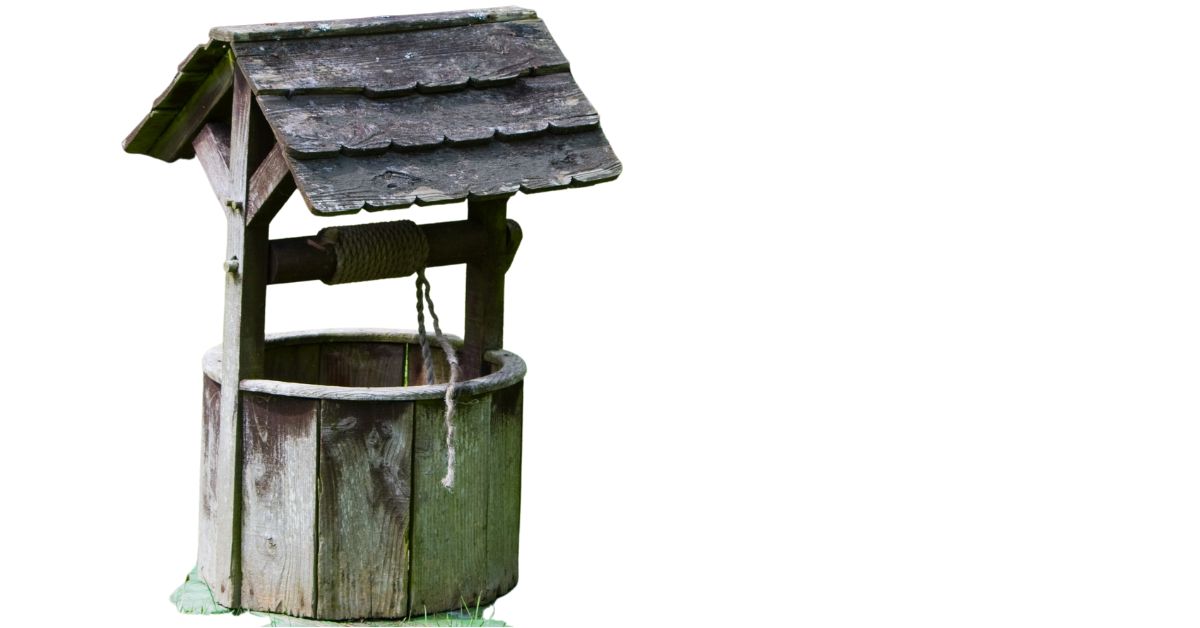A well is primarily a symbol of life and sustenance. Wherever there is a well there is water and thus, there is life. Wells can also symbolize abundance and community.
Below, we discuss various meanings of a well in different contexts and some of things a well symbolizes.
What You'll Learn Today
A Symbol Of Life

A well is chiefly a symbol of life.
That’s because wells are a source of water, which is crucial to life. Since wells are typically found in dry areas that lack rivers, natural springs and other sources of water, a well is literally the life of the community around it.
A well can also be a crucial source of water – and thus life – during famine and drought.
A well featured in an art piece, a book, film or some other context can represent life or sustenance.
Anything or anyone who is extremely important to the life and happiness of others can also be symbolized by a well.
Wells Symbolize Abundance
Wells are often used to symbolize an abundance of something. This symbolism arises from the fact that a well holds plenty of water.
It can be an abundance of wealth. In this case, the well symbolizes riches and wealth.
It can also be an abundance of a virtue like wisdom, positivity, caring or empathy. You can say about someone that they are ‘a well of wisdom’.
If someone is extremely smart in a particular area, they are a ‘well of knowledge’.
You could use a well to symbolize less pleasant things as well like anger, hatred, or greed. But because wells contain water, which is good, wells are typically used to indicate only good things.
What Does The Depth Of A Well Symbolize?
Unlike other sources of water like rivers and springs, a well requires digging deep into the earth. Most wells are at least 100 feet deep and could go as deep as 800 feet or more depending on the terrain.
This effort to get water from a well symbolizes the toil and hard work we have to do to achieve success in life.
You have to dig and dig some more, sometimes through hard unyielding rock (representing life challenges) to get to your goals.
The depth of a well can also represent going deep into ourselves to discover our true selves. It’s not easy work to dig through the layers of expectations, lies and trauma to find what we are meant to be.
In some contexts, the depth of wells symbolizes something mysterious. Something might live in the depths of the well, probably something dark or evil.
This symbolism is common in fairy tales where strange creatures dwell in wells. Sometimes, wells might even possess magic abilities.
Wells As A Symbol of Truth
‘Truth lies at the bottom of a well’ is a quote from the Greek philosopher, Democritus.
It means that sometimes you have to dig deep to discover the truth, either about yourself or other people.
At the bottom of the well is where you’ll find water. Like a mirror, water does not lie. It reflects back truths.
What Do Wells Symbolize In The Bible?

Wells are mentioned many times in the Bible. That’s because Israelites lived in a dry place without many rivers to provide water.
So they had to dig up wells to get water for themselves, their flocks and farming.
Wells were essentially a symbol of life for the Israelites. In fact, an enemy capturing a well was the same as them taking control of the community that depended on that well.
As narrated in 2 Chronicles 32:3, destroying wells or blocking access to the water was one of the techniques used to stop approaching enemies in their tracks.
The Bible also uses wells in many verses to represent God’s blessings and abundance.
Here’s one reference in Deuteronomy 6:10-11.
He swore to your fathers, Abraham, Isaac and Jacob, to give you, great and splendid cities which you did not build, and houses full of all good things which you did not fill, and hewn cisterns which you did not dig, vineyards and olive trees which you did not plant, and you eat and are satisfied.
Also in Numbers 21:16.
From there they continued on to Beer, the well where the Lord said to Moses, “Gather the people together and I will give them water.”
Wells in the bible also represent rebirth and salvation.
Isaiah 12:3 says:
With joy you will draw water from the wells of salvation.
And in John 4:14, Jesus says:
But whoever drinks of the water that I will give him will never be thirsty again. The water that I will give him will become in him a spring of water welling up to eternal life.
Another interesting thing to note is that many important events in the Bible took place at wells. In many cases, wells were important landmarks that indicated something momentous that took place there.
Below are a few examples.
- Jesus says the above words in John 4:14 while talking to a Samaritan woman who comes to draw water from Jacob’s well.
- In Genesis 16:7, an angel found Hagar near a spring or well after she’d run away from Sarah (Sarai at the time). It was there that she was blessed with Ishmael and the well was named Beer Lahai Roi (the well of him that lives and sees me).
- It is at a well where Jacob meets his future wife, Rachel (Genesis 29).
Wells As A Symbol Of Community
Today most wells are dug in private homes and farms. And even for the communal wells, water is delivered via pumps and pipes to people’s homes.
In contrast, wells long ago were often communal. They were often centrally located where everyone could easily access the water.
They were a literal and figurative center of the community. Through the well’s life sustaining water, it kept the community healthy and united.
Because people had to come to the well to fetch water, wells were a center of socialization. It was an opportunity to meet other members of the village.
In fact, wells were the start of many marriages in the Bible as is the case with Jacob and Rachel. Moses and Zipporah also met at a well.
A lot of African literature features dating and betrothal scenes taking place at wells.
What Does Throwing A Coin Into A Well Symbolize?
The idea of throwing coins into a well or fountain came from the notion that there were guardians, spirits or deities living in the water.
Throwing a coin into the well would supposedly grant them their wish. It’s where the term ‘wishing well’ comes from.
These days people still throw coins in fountains mostly for good luck.
Wishing wells are often depicted in films, art and books to symbolize good fortune.
Other Well Meanings and Symbolisms
- In some cultures, a well represents a woman’s fertility or the womb. A closed well symbolizes a virgin woman while a stream flowing into a well represents sex.
- In stories and fairy tales, wells are used to symbolize unknown and mysterious places.
- In Christianity, a well is a symbol of baptism, rebirth and salvation. The Bible often mentions springs and wells in relation to God’s salvation.
- You’ve probably read or seen a news story about someone, usually a child, falling into a well. There are also plenty of stories featuring such misfortune. Wells can sometimes symbolize danger in our own lives.
- The term ‘fountain of youth’ can also refer to wells and springs that restores youth and good health. In real life, this can be anything that keeps you happy, healthy and productive such as family, a good job, a hobby and so on.
- A well can symbolize a place of healing. Some cultures long ago believed wells had healing powers and even included them in their worship. Other cultures went as far as sacrificing to the wells to get healing, wealth and other blessings.
- In places like Japan and Ireland, wells have spiritual connotations. A well can indicate that a place has spiritual importance or is sacred.
- A well drying up can indicate life going out of someone. It doesn’t always mean literal death – it can be a loss of hope or joy. An empty well also symbolizes poverty and suffering.
Bottom Line
Across different cultures and spiritual contexts, the overarching meaning of a well is something that gives out something.
In most cases, it gives life. But it can also be a source of abundance, knowledge, wealth, hope, happiness, and salvation.
Looking for more symbols and their meanings? You can read this guide to narwhal and their spiritual meanings.